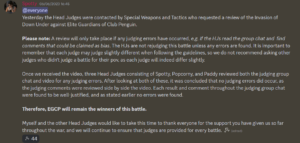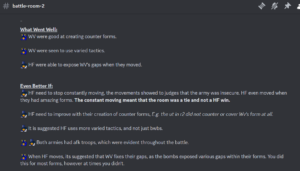Over time, affiliation has become a bigger and bigger issue within the army community. Whether it be for judging or for writing posts, people are constantly judged by the armies they have been in. But does it truly matter?

Designed by Master DS
Over the past few years, affiliation has become an increasingly big problem within the army community. There have been many cries from army leaders about judges being “biased”. These claims are not just limited to judging either, they are targeted towards anyone who has been in an army. Yet, one question that often comes to mind is “Does it matter?”. There are quite a few arguments that could be made for both sides of the coin but these arguments may differ for each organisation. For example, what people think about certain judges may differ from what people think of their media work. Yet these claims are still often seen.
I aim to dissect each argument and determine whether or not affiliation actually matters.
Judging Affiliation
When thinking about affiliation issues or concerns, judging comes to the front of my mind. I say this because issues have often been raised about bias or misjudging. Yet, the judges (and others) refute claims of bias every time. With that said, in each situation, the judging is checked and there is rarely ever any bias in the opinion of the Head Judges.

A review from World War IX
Despite the fact that “bias” is rarely concluded, many continue to claim that judges have been biased during a battle. One of the reasons judges are vetoed is because of their past affiliation to an army. However, while the guidelines state that a person becomes unaffiliated after three months of being out of an army, people are often seen as affiliated long after they take their leave from armies. This could be because they were in the army for a long time or made a big impact. Yet, this is not always the case.
It is easy to call a judge biased because of how they judge a battle. But, it is not so easy to acknowledge their point of view. Since last year, new judging guidelines have created a balance within the judging organisation. This has led to less complaints being made. Yet, this does not mean that judges are incapable of making errors or close decisions. Sometimes, battles are extremely close and what may seem like the obvious decision may not be the correct one.
When judging, judges have to take into consideration, size, forms, creativity, movement, repetition, if an army covers, who looks the best and more. All of these things can be objective. What may look creative to one person may look messy to another. Each judge can make unbiased decisions that can be controversial but their own (uninfluenced decision). Does this make a person biased? No. It simply makes them human. Even when following the judging guidelines, certain situations are up to the judges’ discretion.

Some notes given to Water Vikings and Help Force after their March Madness battle
To some, movement may be a bad thing because they are not giving forms a chance or battling head-on. However, to others, an army moving and recognising its flaws could be seen as a good thing, as long as their move is justified and their new form helps them. Everything that a judge does can be opinion-based. Each judge is different. Each opinion may differ yet adhere to the same judging guideline with evidence to back up their claims. But that is not bias. A person’s decision may not be because of their affiliation but is just how they saw the battle.
With that being said, there is one more question to be tackled. Can affiliation affect judging? Well, unconsciously or consciously, affiliations can affect judging. However, it is not easy to be biased with other judges in the same room as you. If a biased opinion widely differs from what judges see or from what happened then it will get called out. This does not mean that it cannot happen but it means that it could be seen by others. Even if biased comments are made and have some truth to them, and even if their comments would affect the result, other judges have to agree before the decision is made. So it certainly would not be a simple task to rig a battle.
Another question is: can judges have their own predictions or opinions before a battle? This is one question that has been mentioned recently. However, while I would argue that judges should not make predictions, them making a prediction does not make them any less neutral. What could make them less neutral is if they participated in the bracketology held by the Community Committee. Participating in this could lead them to want an army to win to prove themselves right, further leading to a change in how they judge. However, in the grand scheme of things, predictions are just that, predictions. They are not what judges “want” to happen but what they think will happen. That is not bias.
Affiliation In Media/Organisations (CPA/CPAB etc)
Affiliation in the media is less talked about in comparison to judging. However, in recent months, it has been the topic of discussion with some writing about topics close to home. Now, when looking at this, it is important to remember that writing is completely different to judging. When thinking about writing a topic, multiple things have to be considered. However, affiliation can affect a writer’s view of situations leading to unintentional bias. If the writer remains neutral in their work, then there is no reason to call them biased.
One of the recent circumstances saw Edu, former Elite Guardians Leader, (as well as others) called out for writing about their own army. At the time, Edu considered himself unaffiliated, however, he did have a passive role within the army. Currently, he serves as a Consul/Advisor. I bring this situation up, not because of the controversy surrounding him but because of the example it shows.
In this situation, Edu could be described as an advisor of sorts but he may not be actively involved. This means that while he is affiliated, he may not be fully involved in the army drama. Again, I’m simply using Edu as an example and not saying that he is or is not. With this in mind, it would not be far-fetched to consider them able to write a neutral post whilst being on the sidelines. However, there is still the affiliation thread. Are advisors affiliated and biased or are they simply trying to share their knowledge?

Over the years, I have seen multiple people hold advisory roles in different armies. Some held multiple at the same time. An example of this is Koloway who currently serves as a Water Vikings and Army of Club Penguin advisor. These armies are very different and have often been on different sides of the battlefield. Yet, he takes it upon himself to offer his advice and wisdom to both. Does that make him more biased or less?
It could be argued that he has a close bond with both and offers his advice when needed. This close bond is personal so there may be underlying bias as well as a clear affiliation to both. However, it can also be argued that he may not be “actively engaged”, making him semi-involved. Yet, at the same time, he may not be involved in the active ongoing or knowledgeable about modern-day army politics (2024). So, despite his “affiliations”, he would be neutral enough to write in an unbiased way.
One key point as I alluded to in a prior paragraph was that WV and ACP are very different armies on different sides of the community so in a way he already is a neutral party, his “role” in the armies does not mean that he is biased towards one side of the community or one army. As for his “affiliation” does it need to come into question?
If he was actively involved as an advisor for both armies, then questions would be made if he started to write posts. However, does being actively involved make someone a worse writer? Does it affect their neutral position? I would argue that, if anything, knowing about the current climate enables a person to write more freely. If a person does not know about an army’s history, per se, yet is writing a post about their history, then they would heavily rely on other people’s work. However, if they are somewhat knowledgeable they can apply their own knowledge whilst doing so and remain neutral. The same applies to posts on recent news.

I have worked in media for a long time and I have seen many different people come in and out of organisations. Each one of these people have different ways of writing. Some people may show bias but unconventional and unintentional bias whereas others can remain neutral. The key thing is that those who have a passion for writing will write. People do not join the media team to write and display propaganda for their army. Even if someone is leading or is just an army member, they can still remain neutral.
The way people read things on the internet changes with the evolution of mankind, each person is different and we perceive things differently. The same can be said about writers and judges. But that does not mean that people are biased. Their knowledge, or lack of, can impact how they view things. Yet, they can still try their best to be neutral.
As for leagues and moderation in CPAB, well that’s a completely different thing altogether. There are often issues that occur or problems that need to be solved. This means that a neutral head is needed to see both sides of the story and to create the fairest possible outcome. So, what does that mean? Well, in the past, people have done things with personal circumstances in mind. This has led to an unfair judgement being made.
Ultimately, we, as a community, are scared of people making “unfair” judgements and acting against a specific army or person. This may not be because we dislike the person in charge but simply because we know what can happen when a person is out for themselves and acts accordingly. We have seen many leagues with active leaders or individuals at the helm, yet the one flaw was the lack of diversity. People are afraid of bias, afraid of being on the wrong side of the sword. So, we ask for unaffiliated heads or staff. Even CPA Judges tried to tackle the issue and were faced with the same issues.
When we have unaffiliated heads or staff, we still have that fear. We still accuse them of being biased and affiliated simply because it is easier for us to accuse someone else than to admit our own flaws. We are afraid to lose.
Are we scared of competition? Are we scared of admitting that we are defeated?
All of these are questions I could dive into but, ultimately, this post would derail and be 5000 words long if I did. With that being said, is there a need for change within the community? Do we need to stop accusing people of bias and face our fears head-on? Is it time for armies to be competitive without looking for a loophole to save the day? Can we stop looking behind our shoulders in fear of who will be called out next?
YOU DECIDE
I don’t know. But being “affiliated” doesn’t matter in my opinion. No offense.
Aight, I’m gonna go judge the next TCP vs. SWAT battle lol! 😀